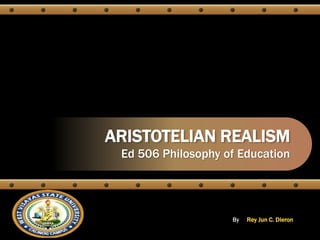
Aristotelian realism
- 1. ARISTOTELIAN REALISM Ed 506 Philosophy of Education By Rey Jun C. Dieron
- 2. REALISM: belief that reality exists independently of observers whatever we believe now is only an approximation of reality and that every new observation brings us closer to understanding reality a doctrine that universals exist outside the mind; specifically : the conception that an abstract term names an independent and unitary reality
- 3. REALISM: The doctrine that objects of sense perception have an existence independent of the act of perception. theory that things exist objectively: the theory that things such as universals, moral facts, and theoretical scientific entities exist independently of people's thoughts and perceptions theory of objectively existing world: the theory that there is an objectively existing world, not dependent on our minds, and that people are able to understand aspects of that world through perception
- 4. ARISTOTLE (384-322 B.C.) Ancient Greek philosopher Aristotle was born circa 384 B.C. in Stagira, Greece. When he turned 17, he enrolled in Plato’s Academy. In 338, he began tutoring Alexander the Great. In 335, Aristotle founded his own school, the Lyceum, in Athens, where he spent most of the rest of his life studying, teaching and writing. Aristotle died in 322 B.C., after he left Athens and fled to Chalcis.
- 5. ARISTOTLE (384-322 B.C.) • Senses are source of knowledge. • Man forms universals, or categories, from many perceptions of like objects. • Presents deductive reasoning based on experience as method of science and philosophy. • produced books in natural science, biology, and psychology. • Aristotle’s Metaphysics produces his view of God as the First Cause Uncaused, pure thought, internal to nature. • Ethics is concerned with individual happiness; Politics is concerned with collective happiness.
- 6. FORMS OF SOUL ARISTOTLE’S PHILOSOPHY OF REALISM
- 7. is the conscious and intellectual soul peculiar to man possessed by plants in that they grow and decay and enjoy nutriment, but they do not have motion and sensation bestows animals with motion and sensation Forms of Soul: Nutritive Soul (plant life) Sensitive Soul (animal life) Rational Soul (human life)
- 8. FOUR CAUSES ARISTOTLE’S PHILOSOPHY OF REALISM
- 9. describes the material out of which something is composed. FOUR CAUSES: MATERIAL CAUSE FORMAL CAUSE EFFICIENT CAUSE FINAL CAUSE is that for the sake of which a thing exists or is done, including both purposeful and instrumental actions and activities. The efficient cause, the formal cause, and the final cause coincide in the concept of "form." Hence form is the propelling, organizing and final principle of becoming. is that from which the change or the ending of the change first starts. It identifies 'what makes of what is made and what causes change of what is changed' and so suggests all sorts of agents, nonliving or living, acting as the sources of change or movement or rest. tells us what a thing is, that anything is determined by the definition, form, pattern, essence, whole, synthesis or archetype
- 10. FOUR CAUSES: To be able to give a rational account of constant change in the realm of natural beings and consequently to lay ground for physics as an explanatory potent science Aristotle introduces a scheme of causal relations. Nature itself is a principle and a cause of change. But we speak about the cause with regard to four different points of reference each pointing to one aspect of the more general question "why something is".
- 11. To ask "why something is" means to identify main factors in the process of potentiality realization. Aristotle explicates this question in a fourfold way: The material cause points to "that from which, as a constituent, an object comes into being." (For instance, the bronze of a statue.) 1. Out of what has a thing come? Answer obtained by identifying: The Material Cause:
- 12. To ask "why something is" means to identify main factors in the process of potentiality realization. Aristotle explicates this question in a fourfold way: The formal cause embodies the essential nature (all essential attributes) and represents the model or archetype of the outcome; conceptually it is expressed in the definition (logos). (It is the idea of the statue as present in artist's head.) 2. What is it? Answer obtained by identifying: The Formal Cause:
- 13. To ask "why something is" means to identify main factors in the process of potentiality realization. Aristotle explicates this question in a fourfold way: The efficient cause is "the source of the change or rest"; it is the moving cause: "what makes of what is made and what changes of what is changed" (the sculptor who makes the statue). 3. By means of what is it? Answer obtained by identifying: The Efficient Cause:
- 14. To ask "why something is" means to identify main factors in the process of potentiality realization. Aristotle explicates this question in a fourfold way: The final cause states "that for the sake of which" a thing is done, or, in other words, it explicates something's end (the final shape or the effect on the audience which admires the statue). 4. For the sake of what is it? Answer obtained by identifying: The Final Cause:
- 15. THE END!
